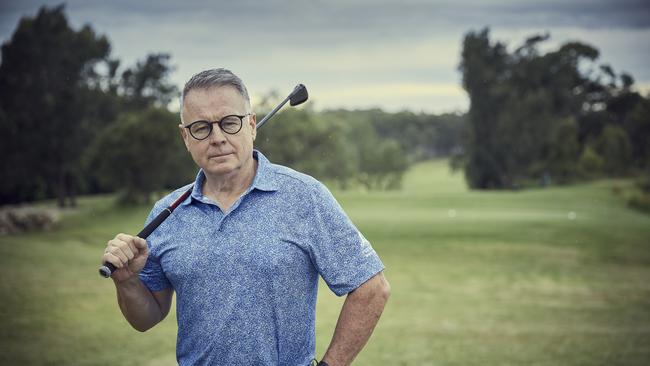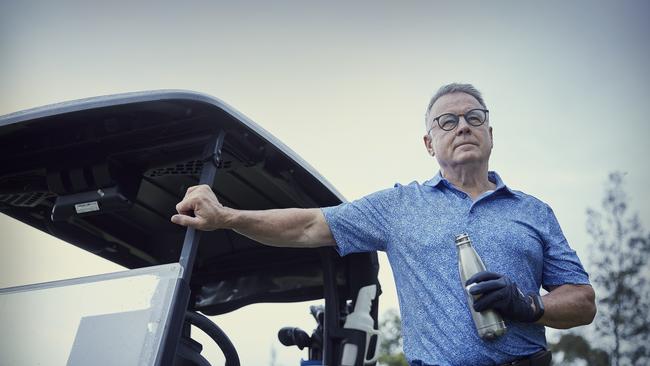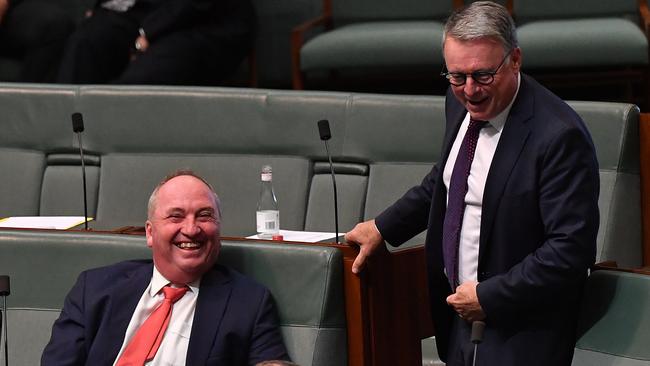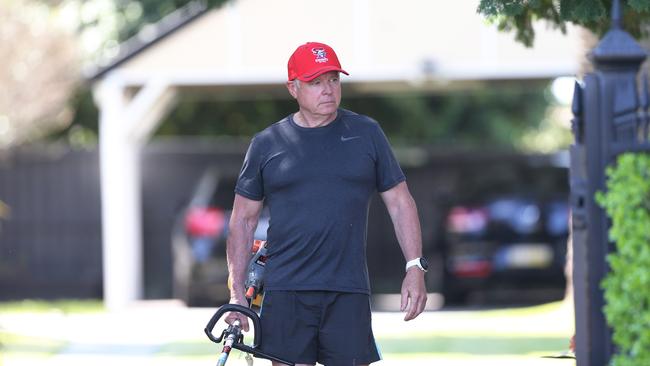Labor’s troublemaker Joel Fitzgibbon takes pride in his controversies
As he prepares to exit federal parliament after more than 25 years, Joel Fitzgibbon is remarkably frank about working behind the scenes to topple party leaders.

As Joel Fitzgibbon prepares to exit federal parliament after more than 25 years as a Labor MP, he makes no apology for often being outspoken and provocative on policy and strategy, and working behind the scenes to topple leaders who threatened the party’s election chances. He wears the “troublemaker” label as a badge of honour.
“Everything I do, including everything I’ve done in the last 2 ½ years, has been about the party, our competitiveness and our capacity to win because we haven’t been very good at that,” Fitzgibbon, 59, tells Inquirer in a remarkably frank interview.
“We’ve won three times from opposition since World War II, and a majority of seats in the house only once in the last 28 years, so we haven’t been very good at winning. My only regret is that I wasn’t more confident in following my own instincts in the earlier years. If I had been, we might have had more success.
“But, you know, if you are roller-skating over a cliff and the party is facing another election defeat and, in some places a very bad defeat, then I think people like me have a responsibility to do something about it and it is not as if there is a whole group of people with the courage to do so.”
It is these sorts of comments that infuriate many of Fitzgibbon’s colleagues. Many also agree with him, but do not say so publicly or with such relish and with a grin from ear to ear. But parties need people like Fitzgibbon who are prepared to offer hard-headed advice in the pursuit of power. He is a supreme pragmatist.
Having been a candidate and MP under eight leaders – from Paul Keating to Anthony Albanese – and served as cabinet minister, shadow minister, chief government whip and convener of the NSW Right and national Right factions, Fitzgibbon has decided not to contest the next election.
Is it a signal that he does not think Labor can win? “Albanese has done his bit to bring us back to the centre ground,” Fitzgibbon says. “I think that has cost him politically within sections of the Left and therefore I give him credit for having the courage. But, while we are now on the right path, we are not quite there yet.”
Fitzgibbon divides his time in parliament into four periods. The first, from 1996 to 2007, was one of “looking backwards in policy terms”. He held several shadow portfolios during this period and argues the party, led by Kim Beazley and Simon Crean, “took a step back and to the left” in response to the market-driven Hawke-Keating era reforms when they should have been defended.
The party drifted, beset by policy confusion and strategic blunders. Fitzgibbon respects Beazley and Crean but says the party lost its way. He was “very close” to Mark Latham, whom he thought could be a good prime minister, but they fell out after his time as leader. Fitzgibbon says they recently reconciled.

The second period, from 2007 to 2010, was one of “lost opportunity”. Fitzgibbon credits Kevin Rudd with leading Labor out of the “wilderness” and winning the 2007 election – a monumental achievement. Rudd was popular, had respect, but in government he “blew it”.
The highest and lowest points of Fitzgibbon’s time in parliament were as defence minister (2007-09) during the Rudd government. He inherited the portfolio with troops in Iraq, Afghanistan, East Timor and the Solomon Islands. He delivered a new defence white paper. And reformed defence procurement.
“I am very proud of my time as defence minister,” he says. “I committed myself to what we called a strategic reform program, which was about finding savings and redirecting that money to areas of high-end capability.
“There was never enough money and difficult decisions had to be made.
“The defence industry is dominated by poor judgment and errors in procurement. Name me a project that hasn’t gone over budget, taken longer to build or failed in some way in the last 40 years?”
The lowest point was his resignation from cabinet after his brother, Mark, who headed health fund NIB, had meetings with officials over business opportunities that involved ministerial staff and were held in his office.
“I should never have resigned but those were the days when we had standards,” he reflects. “I was technically in breach of the Ministerial Code of Conduct, and I didn’t want to ask my prime minister to argue otherwise in the House of Representatives, so I fell on my sword.”
The third period Fitzgibbon marks out is 2010-13, when Julia Gillard seized the prime ministership, lost Labor’s parliamentary majority, the party was beset by turmoil and destabilisation, then Rudd returned, only to see the government cascade to defeat.
These were “the crisis management years”, he says, and the party often looked like “a rabble”. Fitzgibbon, then a backbench factional kingpin, played a key role in Rudd’s return as prime minister. His public criticisms of the government, and Gillard, were lethal.

The fourth period, 2013 to the present, is described as one of “hubris and delusion”. Fitzgibbon says the party has been plagued by “institutionalised elitism” and “obsessed with issues that are most likely to be found on Twitter”. He accepted Bill Shorten’s leadership and, after two election defeats, helped clear the field for Albanese to become leader in 2019.
In opposition again, Fitzgibbon held the shadow portfolios of rural and regional affairs, primary industries and resources. He established a country caucus and held policy and strategy forums, aimed at winning regional seats necessary to form a government. He laments that these initiatives have “withered on the vine” since he resigned from the shadow cabinet last year.
Helping Rudd depose Beazley and Gillard was brutal politics, but vindicated at the ballot box. Fitzgibbon says he would have lost his seat of Hunter if Gillard led Labor to the 2013 election. The churn of leaders, however, came at a cost for Labor.
In 2013, Rudd pushed through a rule change so that the leader is elected by MPs and party members voting in equal proportion. Fitzgibbon says the party should revert to caucus election of the leader – which it could do by a simple partyroom resolution – because party members do not reflect the broader community.
“In the scramble to form a new government, we made a structural change that produced a very poor outcome for the party,” he says. “To win the leadership now, you’ve got to win a beauty contest and I don’t think for a moment that the rank-and-file are better placed than members of the caucus to determine who is the best person to lead the party.
“To have any hope of winning the beauty contest you have to take a step to the progressive left because as the traditional base have exited the party, grown old, tired or sadly passed, that vacuum has been filled by younger, more progressive people, particularly in the capital cities.”
Another regret is the decline of the NSW Right faction, once feared for its ruthlessness and admired for its strategic nous and campaigning capacity, but now divided and sapped of its influence.
“There are a sufficient number of progressives in the Right who, when combined with the progressives in the Left, have the majority in the caucus,” he says. “So, normally the Right has the numbers but more realistically the progressives now have the numbers.
“Why has that happened? Well, some are choosing to jump to the progressive Left even though they are in the Right for their own ambitions for the leadership, and others just find themselves with rapidly changing demographics in very progressive seats.”

Labor must select candidates who reflect their electorate, Fitzgibbon argues. He is bemused by Kristina Keneally’s parachute into the western Sydney seat of Fowler after losing party support to lead Labor’s Senate ticket. She held a state seat in the eastern suburbs and ran for the federal seat of Bennelong in the northern suburbs in 2017.
“I lament the fact that she was not able to be deployed to a marginal government seat that we need to win to win government,” Fitzgibbon says. “She is obviously a person with considerable talent, but one wonders how much political capital can be spent on one person.”
Fitzgibbon was an automotive electrician and taught at TAFE before working in his father Eric Fitzgibbon’s electorate office and succeeding him as the member for Hunter in 1996. He has been an effective advocate for working-class voters alongside the aspirational middle class, and especially the mining, agriculture and tourism industries.
“The party I joined in 1984 was full of blue-collar workers, trade unionists, with a laser-like focus on jobs and lifting people to a higher economic plane,” he says. “The typical party branch today is full of progressives who want to spend all of their time talking about climate change or gender equity rather than the things that really matter to people.
“We spend too much time laughing at our political opponents rather than strategising how we can beat them. The definition of madness is to keep doing the same thing and expect a different result. We think that we are morally and intellectually superior to them and yet they seem to kick our arses at every election.”
In a parting message to the party he has served almost his entire adult life, Fitzgibbon says Labor must reposition itself in the centre ground of politics, not succumb to trendy progressive opinion and convince voters the party can be trusted to govern.
“The most important thing is winning because if you’re not on the government benches, then you can’t pursue your policy reform agenda,” Fitzgibbon says.
“I’ve said a million times, you can have the best climate change policy in the world but it’s not much good if it sits in the top drawer of the office desk after every election campaign.
“The reality is that we are not the natural party of government. The voters will only come to us if they believe that their economic security will be improved or maintained. We have to give them that confidence. That has to be our number one priority.”


To join the conversation, please log in. Don't have an account? Register
Join the conversation, you are commenting as Logout